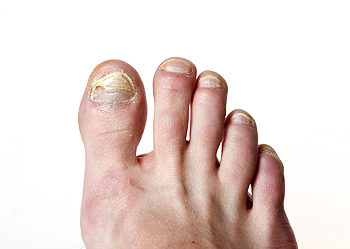
Aging is a risk factor for many diseases. Seniors take more medications, have weaker immune systems, and are more apt to suffer from pre-existing medical conditions, as well as mobility issues. While elderly nail fungus is not generally severe, it can be uncomfortable, and if left untreated, complications such as permanent nail damage or more serious infections can develop. Nail infections are caused by fungal organisms called fungi. These fungi can feed on keratin, present in the nails, hair, and skin. Such infections can also be caused by yeast and mold spores. The fungi get into the skin and nails from direct contact with infected materials, whether from animals, people, or clothes. Elderly nails are more likely to become brittle and have more cracks, and this makes it easier for the organisms to get inside and spread. Toenail fungus is more common than fingernail fungus. Symptoms typically include thick, discolored, brittle and damaged nails, with jagged edges and possibly a bad odor. Pain may also be present. Toenail fungus may be more prevalent in those with diabetes, recurring skin conditions, and circulation problems as these hinder the body’s ability to fight infection. If you are elderly or taking care of someone who has toenail fungus is a concern, contact a podiatrist who can help you with all foot and ankle-related conditions.
For more information about treatment, contact Patrick Bruton, DPM of Big Country foot and Ankle. Our doctor can provide the care you need to keep you pain-free and on your feet.
Toenail Fungus Treatment
Toenail fungus is a condition that affects many people and can be especially hard to get rid of. Fortunately, there are several methods to go about treating and avoiding it.
Antifungals & Deterrence
Oral antifungal medicine has been shown to be effective in many cases. It is important to consult with a podiatrist to determine the proper regiment for you, or potentially explore other options.
Applying foot powder on the feet and shoes helps keep the feet free of moisture and sweat.
Sandals or open toed shoes – Wearing these will allow air movement and help keep feet dry. They also expose your feet to light, which fungus cannot tolerate. Socks with moisture wicking material also help as well.
If you have any questions please feel free to contact our offices located in Abilene, and Brownwood, TX . We offer the newest diagnostic tools and technology to treat your foot and ankle needs.
